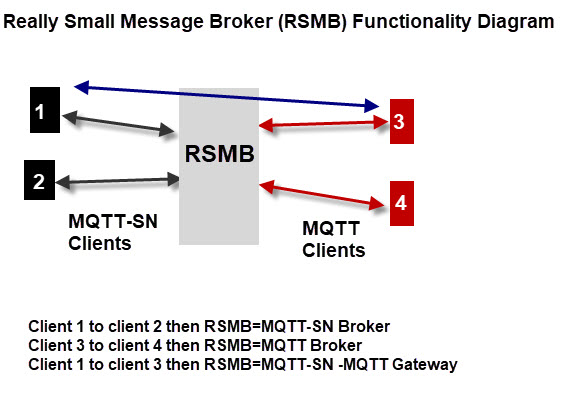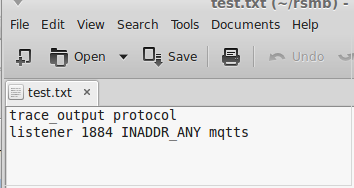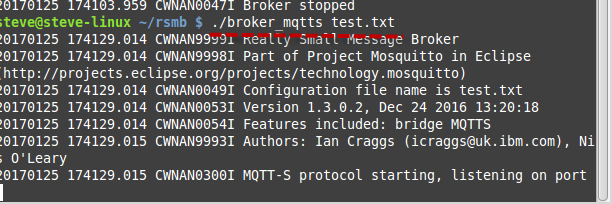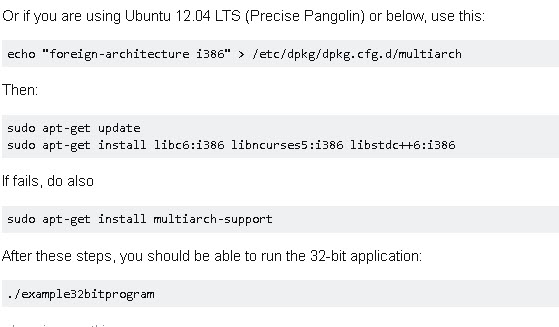The RSMB MQTT-SN broker written by Ian Craggs of IBM isn’t currently being actively developed, but it is still invaluable for anyone wanting to get experience using MQTT-SN.
See
Important Note: There is a upgrade to the RSMB broker that fixes a few problems with it like pre-defined topics it is available on Github here. I recommend you use this version.
The RSMB broker functions both as a MQTT-SN broker and also as an MQTT broker allowing messages between MQTT-SN clients and MQTT clients, as shown in the diagram below:

An MQTT-SN client can publish on a topic that can be received by an MQTT-SN client or an MQTT client subscribed to that topic.
Likewise; An MQTT client can publish on a topic that can be received by an MQTT-SN client or an MQTT client subscribed to that topic.
The demo python scripts in the downloads illustrate this.
Installing the Broker
You can download the RSMB ( Really small message broker here . Unzip it.
When you unzip it you should see a directory structure like the one below:

Open the RSMB folder and go to the src folder:

In the src folder you will find the source files (.c and .h files), it also contains a Makefile that contains instructions to build the broker.
Navigate to this directory and run make to compile the broker.
Note: On Linux the compiler will already be installed and so this will work. However on Windows you will need the necessary software installed. I have only done this on Linux.
You get two brokers called broker and broker_mqtts.
The broker program only supports MQTT over TCP.
The broker_mqtts is the one you need to run MQTT-SN.
I copied the broker files into a directory of their own and created a configuration file called text.txt you also need to copy the messages.1.3.0.2 file.
In the configuration file I turned on detailed logging and set the broker port for 1884 just to test it. here is the file.

To run it at a command prompt type.
./broker_mqtts test.txt

If you want the broker to advertise the Gateway address then use this config file.
trace_output protocol # normal MQTT listener listener 1883 INADDR_ANY # MQTT-S listener listener 1885 INADDR_ANY mqtts # optional multicast groups to listen on multicast_groups 224.0.18.83 #This will advertise the Gateway address to clients # optional advertise packets parameters: address, interval, gateway_id advertise 225.0.18.83:1885 30 33
Notice that in the config file above MQTT uses the standard port 1883:
listener 1883 INADDR_ANY
and MQTT-SN uses port 1885.
listener 1885 INADDR_ANY mqtts
The line:
advertise 225.0.18.83:1885 30 33
sets port 1885 as the multicast port and it is the same as the UDP port. However they can be different.
You will need to configure the MQTT-SN client to listen on port 1885 and Multicast IP of 225.0.18.83 to receive the multicast messages.
This is what the output of the Python client shows when gateway is found

64 bit Processors
If you want to run it on a 64 bit processor it may fail with a strange warning that it can’t find the file.
On Ubuntu you need to do the following:

Screen shot above taken from this forum post.
RSMB Notes
From the documentation and my testing The broker does not support the following:
- QOS 2
- searchGW
- clean sessions
- Sleeping Clients
RSMB Alternatives
There aren’t any free MQTT-SN brokers as far as I am aware.There is a Gateway available and released by the Eclipse foundation.
Video – RSMB and Python MQTT-SN Client Demo
Common Questions and Answers
Q -Can I use the MQTT-SN broker as a MQTT broker?
A – Yes provided it is enabled in the config file
Q -Does a client use the same UDP port for sending MQTT-SN messages as used by the Advertisement Multicast messages.
A – It depends on the configuration file>they can be the same or Different.
Q- Do I need to use the advertise feature?
A- No it is optional
Resources:
There is a very useful getttingstarted.htm file in the doc folder.
Related Tutorials :

Hi Steve,
I want to connect two mqtt-sn nodes on Contiki (Cooja simulator) through RSMB mqtt-sn broker.
After settings nodes, for the broker part, do I only need to use this line on config.mqtt :
# MQTT-S listener
listener 1884 INADDR_ANY mqtts
yes I believe so but I would also use
trace_output protocol
so you can see the messages
Rgds
Steve
Hi,
Thank you for your work and your effort.
when I run ./broker_mqtts on my raspberry everything goes fine until when it has to announce the gateway address to the clients, it doesn’t announce it and at that moment I get the following error message and the execution stops.
##### SEGV signal received – recording FFDC and stopping #####
First Failure Data Capture (FFDC) information written to the FFDC.CWNAN.20220119.204230.308.dmp file.
I have searched for information but nothing is clear.
Regards.
Do you have the conf file you are using? Have you tried commenting out the announce line to see if it stays up?
rgds
steve
Hi Steve,
I have commented out the announcement line and now the rsmb starts up and listens. I have tried the publish.py script and the rsmb receives the information. But I have the question why if I add the announcement line the rsmb stops when starting.
I am doing the tests from my laptop to the raspberry where the rsmb is executed. The rsmb configuration is:
trace_output protocol
# normal MQTT listener
#listener 1883 INADDR_ANY
# MQTT-SN listener
listener 1885 INADDR_ANY mqtts
# optional multicast groups to listen on
multicast_groups 224.0.18.83
# This will advertise the Gateway address to clients
# optional advertise packets parameters: address-port, interval, gateway_id
#advertise 225.0.18.83.1884 30 33
Regards.
I will take a look on mine with you config file and get back.
Rgds
Steve
Hi
I think it is the dot before port225.0.18.83.1884 30 33
should be a :
225.0.18.83:1884 30 33
rgds
steve
Hi Steve,
thanks for the help, the error was at that dot.
I have another question. As I said, I have installed and configured my raspberry to be the RSMB broker, I have started the broker with the test.txt configuration. Then I have downloaded the MQTT-SN client files and the demos on my laptop that has windows 10. I have tried to run the multicast-scan.py file from my computer, but I do not receive anything, I do not receive the announcement from the raspberry gateway, it just stays on “starting scan”. The communication I try is by wifi.
The raspberry is configured:
wlan0: flags=4163 mtu 1500
inet 192.168.1.132 netmask 255.255.255.0 broadcast 192.168.1.255
The laptop is configured:
IPv4 address: 192.168.1.129
Subnet Mask: 255.255.255.0
Default gateway: 192.168.1.1
The configuration of the rsmb broker on the raspberry is as follows:
trace_output protocol
# normal MQTT listener
listener 1883 INADDR_ANY mqtt
# MQTT-SN listener
listener 1885 INADDR_ANY mqtts
# optional multicast groups to listen on
multicast_groups 224.0.18.83
# This will advertise the Gateway address to clients
# optional advertise packets parameters: address-port, interval, gateway_id
advertise 225.0.18.83:1884 30 33
The configuration of the multicast-scan.py file is as follows:
multicast_group = “225.1.1.1”
multicast_group=”225.0.18.83″ #rsmb
multicast_port=1884
server_address = (”, multicast_port)
code=”utf8″
host_address=dict()
BEGIN=”HTTP/1.1″
timeout=0.25
I’ve followed all the steps in the video, but I can’t get this script to work the way it works for you.
Regards.
Hi
You need to set the multicast post in the multicast scan to 1884
Rgds
Steve
Hi Steve,
the error was there. Thank you.
Now I’m trying to run the multicast-scan.py script from my windows 10 laptop, while my raspberry is running rsmb, but I don’t get the rsmb gateway advertisement. I have followed the steps in the video with the same configuration as yours.
Configuration rsmb:
trace_output protocol
listener 1883 INADDR_ANY mqtt
listener 1885 INADDR_ANY mqtts
multicast_groups 224.0.18.83
advertise 225.0.18.83:1884 30 33
multicast-scan.py file:
multicast_group = “225.1.1.1”
multicast_group =”225.0.18.83″ #rsmb
multicast_port=1884
server_address = (”, multicast_port)
code=”utf8″
host_address=dict()
BEGIN=”HTTP/1.1″
timeout=0.25
Regards.
Hi
You need to set the multicast post in the multicast scan to 1884
Rgds
Steve
Hey Steve,
Can you please help me with Eclipse Paho MQTTSN Gateway connection to AWS Iot Core. Have you tried it ?
I wanted the steps to try the above mentioned setup.
Hi
No I haven’t tried it. First I would try using a client to connect to AWS as the gateway is effectively a client. Once the client connects ok then configure the Gateway
Rgds
Steve
I have tested out the client connection with AWS Iot and it works fine. Actually thing is i am getting Gateway not found error when i enable the Authentication in mqttsn_gateway.conf file.
I have added my mqttsn client name in the clients file But i am not clear about any other parameters. Like which IP address is mentioned in below configuration. When i connect with a local broker it connects with 192.168.1.102 always and i am not sure about the Port as well. Which port they are talking about ? My UDP port setting is 47193 , while MQTT connects to 1883 port.
For Eg:
GatewayTester, 172.16.1.11:20020
ClientPUB,172.16.1.11:2010
Client01,172.16.1.11:12001
Client02,172.16.1.11:12002
Client03,172.16.1.11:13003
#below is mine
node1,192.168.1.102:1883
Please help. I am not getting assistance from anywhere
Can you help me anyway
I have tested MQTT connection with AWS Iot but thing is when i enable the client authentication in mqttsn-gateway config file my mqttsn clients re unable to find gateway. I have added my mqttsn client in client list but i dont know exactly what are the parameters i need to set.
Like there is client name, IP Address and Port Name. I don’t know what IP address they are talking about and also port name. Client name i can imagine is of mqttsn client ID.
My all clients are connecting to mqtt broker with the same Ip address 192.168.1.102 and the port for Mosquitto is 1883 while port for UDP is 47193.
Can you please help me with the configurations in the clients.config file
Can you give me the client details you use to cnnnect an MQTT client to AWS.
Also do you have an mqtt broker that you can use to work with the Gateway. It is best to set your local mqtt broker with more or less the same config as aws and get it working locally and then move to AWS.
I assume AWS wants authentication and SSL?
Hello,
I have tested with local broker like mosquitto running on my PC or Eclipse Public broker but without authentication.
“I assume AWS wants authentication and SSL?”
Yes for the same we have to pass the RootCA certificates and private key files to it in paho-mqttsn-gateway.conf file.
What exactly you mean by client details. In my program i have client name set to “P-l496G-CELL01” with topic name snode/test. I don’t know which IP address and port the clients list reffer to in paho-mqttsn-gateway-clients file. In my openthread devices my mqttsn devices are sending data on default UDP port 47193.
Hello Steve
I want to know if you can help me, Is there a way that RSMB sends a willtopicreq and will topicmessage to the mqttsn client? I would like to use those messages with my client.
THANKS
I’m not sure they are implemented in RSMB I will have to do some tests
Rgds
Steve
Hello
I´d like to know if there´s a way rsmb sends pingreq to the mqttsn client, I know that it´s no neccesary due to the connection runs over udp but I want to analyse the management traffic so I need RSMB or the mqttsn python client sens pinreq each 30 secs, I saw that there´s a keepalive parameter but I dont jnow how to use it, can you help me?
Thanks
What client are you using?
Hello Steve,
Let’s say the MQTT-SN works is configured as a bridge towards an MQTT broker, and the later has been setup with an authentication plugin (e.g. mqtt-go-auth connected to a Postgres database). What configuration is needed in MQTT-SN to forward the mqtt client username/password to the MQTT broker through the MQTT-SN gateway? Is this supported?
Mqtt-sn doesn’t use username/password. I’m not sure if the paho gateway will do client mapping to insert it as I haven’t looked at it in that detail. I don’t think RSMB does.
Sorry I can’t be more help.
Rgds
Steve
Thanks Steve,
FYI I’ve just tested Paho MQTT-SNGateway and several configuration experiments with no luck to forward the client/pass of the MQTT client to the MQTT broker.
Great thank you so much, I tried all the examples that you provided in the video and all of them are working. The only thing is when I try to use the multicasting IP I can’t connect to 225.0.18.83
So I ran the broker, pub-sub-mqtt-mqttsn-1, and pub-sub-mqttsn-mqtt on the same machine using the host IP and 1885 port, and everything was working fine.
HOWEVER,
When I tried to run a broker, 1 mqtt-client, and 2 MQTT-SN clients. I started the Broker and start publishing from the mqtt-client and I did connect to the broker, but when I ran the MQTT-SN using the m_group which is the 225.0.18.83 IP and m_port 1885 it is not connecting to the gateway somehow.
If you can help me or give me advice that would be great. I’m new to MQTT and RSMB so I’m just getting to understand these stuff and how it works.
the m_port and group is only used for gateway discovery not for sending and receiving messages.
you should set the port and broker address to what is configured on the RSMB
Rgds
Steve
Hello Steve,
thanks for the explanation and the video. I just have one problem in which when I start the broker and start advertising. I run the multi-scan script and I’m not getting anything. I did follow your video and I realized that in the config file for the RSMB broker you have the listener on 1885 and advertising the gateway using 225.0.18.83:1884 30 33 in the video. but in the provided config it is port 1885. I tried both and still not working.
Hi
I will take a look but will probably take a few days. Use the ask steve page and send me the config file you are using.
Rgds
Steve
If you look at the broker console you should see the broker advertising. I set min to advertise every 30 secs using
advertise 255.0.18.83:1885 30 33
have you configured this on the broker this is my complete config file
######################
trace_output protocol
# normal MQTT listener
listener 1886 INADDR_ANY
# MQTT-S listener
listener 1885 INADDR_ANY mqtts
# optional multicast groups to listen on
multicast_groups 224.0.18.83
#This will advertise the Gateway address to clients
optional advertise packets parameters: address, interval, gateway_id
advertise 225.0.18.83:1885 30 33